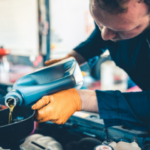12 Tips for Preventing Car Overheating: Essential Guide from 1800auto
Car overheating is one of the most common issues drivers face, especially during the summer months or in hotter climates. When a car’s engine overheats, it can lead to serious damage, costly repairs, and even complete engine failure. In fact, according to the AAA Foundation for Traffic Safety, overheating is responsible for a significant portion of vehicle breakdowns, with over 400,000 roadside assistance calls related to cooling system failures annually in the U.S. To help prevent such issues, we’ve compiled 12 essential tips for preventing car overheating as advised by experts from 1800auto. Following these guidelines can ensure your car runs smoothly and safely, even in extreme conditions.
Understanding Car Overheating
Before diving into the prevention tips, it’s important to understand why cars overheat in the first place. Typically, overheating happens when the car’s cooling system fails to keep the engine temperature within an optimal range. Common causes include:
- Low coolant levels: Coolant helps dissipate heat from the engine. If it’s low, the engine may overheat.
- Broken radiator fan: The fan helps cool the radiator by drawing air through it. If it malfunctions, the radiator won’t be able to reduce the engine’s temperature.
- Faulty thermostat: This regulates the flow of coolant to the engine. If stuck, it can cause overheating.
- Blocked hoses or radiator: Debris, corrosion, or other blockages can restrict the flow of coolant, leading to overheating.

Understanding these causes allows for better preventative maintenance, ensuring your car stays cool even during long drives or under heavy load.
12 Tips for Preventing Car Overheating
To keep your car running efficiently, it’s crucial to take preventive measures. Here are 12 expert tips from 1800autothat will help you avoid overheating issues:
1. Check Coolant Levels Regularly
One of the simplest yet most effective ways to prevent overheating is to ensure that your coolant reservoir is filled to the appropriate level. Check it regularly, especially before long trips. If you notice it’s frequently low, there could be a leak in the system.
2. Flush the Radiator Periodically
Over time, coolant can accumulate debris and become less effective. To prevent clogs and blockages, it’s essential to flush the radiator periodically, ideally every 30,000 miles or as recommended by your vehicle’s manufacturer.
3. Inspect the Radiator Cap
A faulty radiator cap can cause coolant to escape or fail to maintain the necessary pressure in the cooling system. Check the radiator cap for signs of wear and replace it if needed.
4. Check the Thermostat
A malfunctioning thermostat can prevent coolant from flowing through the engine, leading to overheating. Test the thermostat regularly and replace it if it shows signs of failure.
5. Maintain the Radiator Fan
The radiator fan plays a crucial role in cooling your car. If the fan isn’t working properly, the radiator won’t be able to cool the engine effectively. Have the fan checked if you notice overheating while idling or driving at low speeds.
6. Keep the Airflow Unobstructed
Ensure that nothing is blocking the airflow to your radiator and engine, such as debris or leaves. Regularly clean the front of your car to maintain good airflow, particularly after driving through rural or wooded areas.
7. Monitor the Temperature Gauge
Your car’s temperature gauge is an early warning system for potential overheating. If the gauge starts creeping toward the red zone, pull over immediately and let your car cool down before continuing.
8. Use the Right Type of Coolant
Not all coolants are created equal. Using the wrong type of coolant can reduce the effectiveness of the cooling system. Always refer to your car’s manual to ensure you’re using the right coolant for your vehicle.
9. Inspect Belts and Hoses
The belts and hoses in your engine help drive the water pump and maintain the flow of coolant. Over time, these components can wear out, causing leaks or restricting coolant flow. Inspect belts and hoses regularly for signs of wear, cracking, or leaks.
10. Avoid Overloading Your Vehicle
Excess weight can put additional strain on your engine, increasing the chances of overheating. Avoid overloading your vehicle, especially during long trips, and try to reduce the load as much as possible.
11. Turn Off the A/C in Extreme Heat
Using the air conditioner in extremely hot weather adds extra strain on your car’s engine. If you notice the temperature gauge rising, turn off the A/C and roll down the windows to reduce the engine’s load.
12. Use the Heater to Cool the Engine
In an emergency, turning on your car’s heater can help dissipate heat from the engine. While this may make the cabin uncomfortable, it can prevent the engine from overheating until you’re able to stop and let it cool down.
The Cost of Ignoring Overheating
Ignoring an overheating engine can lead to severe consequences. The engine is composed of various metals and components that expand and contract with heat. When overheating occurs, these parts can warp, crack, or fail completely. Repairing or replacing a damaged engine can be extremely expensive, with costs ranging from $1,500 to $4,000, depending on the severity of the damage.
According to a report from CarMD, engine failures related to cooling system malfunctions are among the top five most expensive vehicle repairs in the U.S., with the average cost of a radiator replacement being around $500 to $1,000. This highlights the importance of regular maintenance and following preventive steps to avoid costly repairs.
Citing Statistics: Why Prevention is Key
Data from the National Highway Traffic Safety Administration (NHTSA) reveals that mechanical failures, including cooling system malfunctions, contribute to thousands of vehicle breakdowns each year. Furthermore, AAA estimates that 20% of summer roadside assistance calls are due to overheating issues. With these alarming statistics, following 12 tips for preventing car overheating from 1800auto can help you avoid becoming part of these statistics and ensure your car stays in optimal condition.
Conclusion
Preventing your car from overheating is crucial for both your vehicle’s longevity and your safety on the road. By following the 12 tips for preventing car overheating 1800auto has provided, you can minimize the risk of costly repairs and dangerous breakdowns. Regular maintenance, vigilance, and using the right products are essential for keeping your car’s engine cool and functioning efficiently. Are you ready to take the necessary steps to prevent car overheating and ensure a smoother, safer ride?







